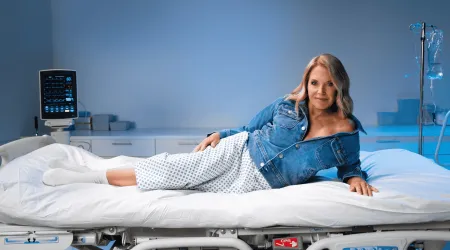Colorectal cancer symptoms
Colon cancer and rectal cancer may not show any symptoms, especially in its early stages. While some colorectal cancer symptoms might be due to other causes like hemorrhoids, diarrhea, infection, or irritable bowel syndrome, it’s important to tell your healthcare provider about any symptoms you notice.
There may be no symptoms!
Early stage colon cancer and rectal cancer often show no symptoms. Polyps or colorectal cancer tumors may be present without any signs, which is why it’s important to get screened.
A change in bowel habits
Changing bowel habits include diarrhea, constipation, narrowing of the stools, and/or feeling like your bowels are not completely empty, even after having a bowel movement.
Persistent abdominal discomfort
Abdominal discomfort can cause feelings such as pain, nausea, cramping, bloating, and/or feeling unusually full, even when you haven’t eaten much.
Rectal bleeding
You might notice blood in the toilet, in your stool, or when you wipe with toilet paper.
Weakness and/or fatigue
Feeling tired, weak, and/or short of breath can be signs of anemia. Anemia can develop from bleeding somewhere inside your body where you can’t see it, such as from a cancerous tumor.
Unexplained weight loss
Cancer sometimes causes weight loss. You should always seek medical attention if you are losing weight for no known reason.

Haleema’s story: Why timely screening matters even without symptoms
When Haleema Burton turned 45, she made an appointment for her first colonoscopy. She had no symptoms or family history of colorectal cancer, but she knew that screening was important. Now, she wants others to understand how crucial this appointment proved to be.

Talking to your doctor
If you notice any symptoms, you need to see your doctor as soon as possible. Learn how to make this conversation a little easier.

Understand your risk factors
Are you at high risk for colon cancer? Knowing if you have a family history of cancer or inherited a gene mutation can significantly increase your lifetime risk.
Listen to your body: Jen Waller’s viral video

Hemorrhoids are bleeding
It’s important to understand that colon cancer symptoms can sometimes be due to other causes. For example, bleeding can be caused by hemorrhoids, a common but usually harmless condition among many adults.

Am I really at risk?
The number of colorectal cancer cases is rising, especially among young people. This is another important reason to talk to your doctor about any symptoms you notice.

Alyssa Blair: staying a step ahead of colorectal cancer
Alyssa Blair can tell you why listening to your body is important. Although she was only 24 at the time, she knew the symptoms of colorectal cancer and that she needed to see her doctor right away. Her story makes it clear that you are never too young to be aware of symptoms.
Screening is essential.
Take the screening quizTop resources

National Cancer Prevention Month: Majority View Encouraging Screening as an Act of Love
Americans increasingly view colorectal cancer screening encouragement as an act of love, with new survey data showing rising openness about lifesaving prevention.

Katie Couric Joins the Colorectal Cancer Alliance To ‘LEAD FROM BEHIND’
Katie Couric joins the Colorectal Cancer Alliance and Ryan Reynolds’ Maximum Effort to expand LEAD FROM BEHIND, a star-powered campaign breaking stigma and urging lifesaving colon cancer screening. Colon cancer is the preventable cancer.

20+ Colorectal Cancer Alliance Screen Smart Partners Encourage Secretary Kennedy to Uphold USPSTF Goal to Improve Health
The Colorectal Cancer Alliance and more than 20 Screen Smart partners urge HHS Secretary Robert F. Kennedy Jr. to protect USPSTF’s evidence-based process and no-cost preventive screenings like colorectal cancer screening, which save lives and improve national health.






